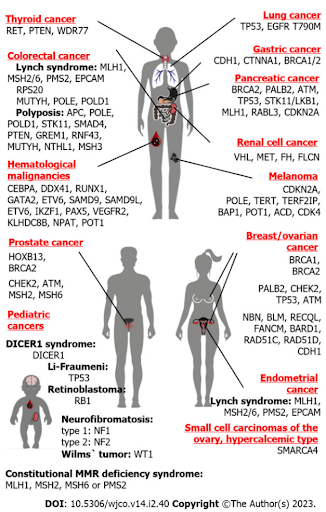Introduction
Hereditary cancer syndromes are genetic disorders in which inherited mutations in one or more genes significantly increase an individual’s risk of developing certain types of cancer. These disorders are typically caused by mutations in tumor suppressor or DNA repair genes that are passed down in families, often in an autosomal dominance pattern. Individuals with hereditary cancer syndromes may be diagnosed with cancer at an earlier age and have increased likelihood of developing various cancers. In families affected by a hereditary cancer syndrome, it is common for multiple relatives to be diagnosed with the same or related types of cancer. Although most cancers are sporadic due to a combination of factors such as aging, environmental exposures and lifestyle choices, it is estimated that hereditary cancer syndromes account for up to 10% of all cancer cases. There are more than 50 known hereditary cancer syndromes, with Hereditary Breast and Ovarian Cancer (HBOC) syndrome and Lynch syndrome being two of the most well-known.
-
HBOC syndrome: HBOC syndrome (prevalence 1:225-500) is caused by inherited mutations in the BRCA1 and BRCA2 genes. Females with HBOC syndrome have an increased risk of developing cancer of the breast, ovaries, fallopian tubes and peritoneum, whereas males with HBOC syndrome have an increased risk for breast and prostate cancer. Additionally, there is also a higher incidence of pancreatic cancer and melanoma in both females and males with HBOC syndrome.
-
Lynch syndrome: Also known as hereditary nonpolyposis colorectal cancer (HNPCC) syndrome (prevalence 1:279), it is the most common genetic syndrome and is associated with early age onset of colorectal cancer. Lynch syndrome is caused by germline mutations in DNA mismatch repair genes (MLH1, MSH2, MSH6, PMS2 and EPCAM), and has been associated with increased risk for other malignancies such as endometrial, ovarian, stomach, pancreatic and urinary tract cancers.
-
Neurofibromatosis type 1 (NF1): Also known as von Recklinghausen syndrome (prevalence 1:3,000), is caused by mutations in the NF1 gene, which produces neurofibromin that helps to control cell growth. Although it is usually associated with growth of benign tumors on skin, nerves and bones, individuals with NF1 have an elevated risk of developing malignant peripheral nerve sheath tumors (MPNST), which grows quickly and can spread to other sites. NF1 is also associated with increased risk of other cancers such as breast cancer, gastrointestinal tumors, sarcomas and leukemias.
-
Li-Fraumeni (LF) syndrome: LF syndrome (prevalence 1:3,500) is an inherited cancer predisposition syndrome caused by mutation in the tumor suppressor TP53 gene, leading to a significantly increased risk of developing various cancers at an early age such as breast cancer, leukemia, brain cancer, sarcomas and adrenocortical carcinomas. People with LF syndrome also have a higher risk of developing more than one cancer when compared to other hereditary cancer syndromes.
-
Familial adenomatous polyposis (FAP) syndrome: FAP, a type of gastrointestinal polyposis syndrome, is caused by pathogenic variants in the APC gene. Individuals with FAP syndrome (prevalence 1:8,000) are predisposed to developing hundreds to thousands of precancerous polyps known as adenomas throughout the gastrointestinal tract (mostly in colon and rectum, but can also occur in the stomach and small intestine), which can turn cancerous if left untreated. Hence, these individuals face a higher risk of developing colorectal cancer, as well as other cancers, including those of the stomach and small intestine.
-
Von Hippel-Lindau syndrome: VHL syndrome (prevalence 1:36,000) is caused by mutations in the tumor suppressor VHL gene, and is characterized by the formation of tumors and cysts in many different parts of the body. Hemangioblastomas, made from newly formed blood vessels, are also a hallmark of VHL syndrome. Although they are not cancerous, they can develop in various organs, including the brain, spinal cord, eyes, kidneys and pancreas, often leading to complications like vision loss and high blood pressure. Individuals with VHL syndrome are also at an increased risk of developing renal and pancreatic cancers.
Genetic mutations play a crucial role in the development of hereditary cancers, influencing an individual’s risk of developing various cancer types. Incorporating next-generation sequencing (NGS) into the diagnosis and management of hereditary cancers by providing a comprehensive analysis of multiple genes in a single test, enhances the accuracy and efficiency of identifying mutations associated with these cancers. This approach facilitates better risk assessment and early detection, leading to tailored care that ultimately improves outcomes for individuals with hereditary cancer syndromes and their families.

Canary Oncoceutics has a steadfast commitment to three fundamental pillars: advancing scientific knowledge, fostering collaboration, and ultimately, enhancing the lives of cancer patients worldwide. From cutting-edge research to impactful clinical advancements, Canary Oncoceutics aims to illuminate the transformative potential of tailored cancer treatments. Join us on this journey towards a future where every cancer patient receives personalized, effective treatment tailored to their unique needs.